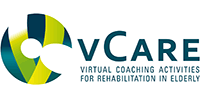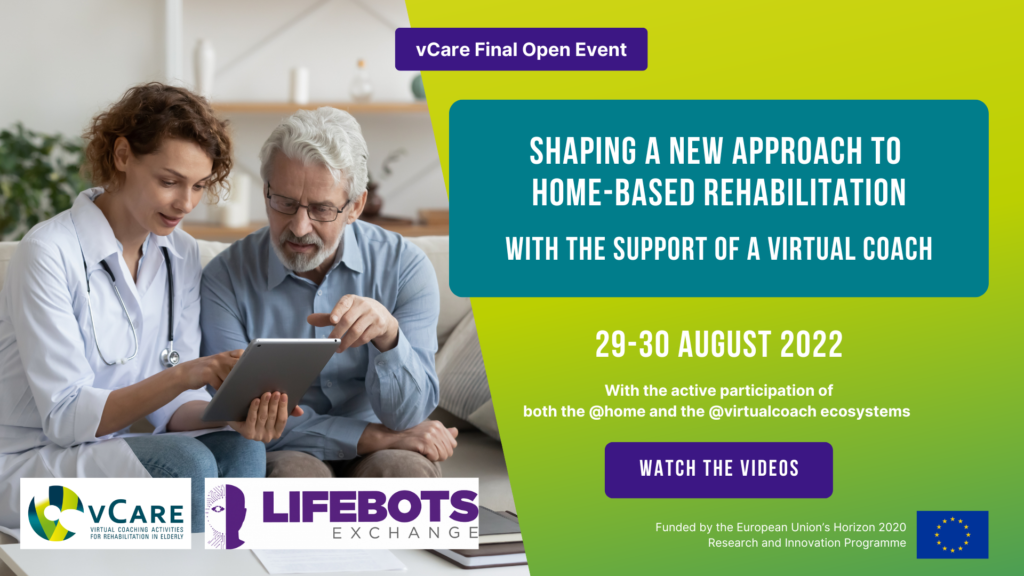vCare Final Open Event
Practicalities:
The main event took place in Brussels on August 29 in the Scotland house Rdpt Robert Schuman 6, 1040 Bruxelles, Belgium, next to the main European Commission building (Berlaymont). Both physical participation and remote participation were possible.
A workshop with the project Lifebots Exchange followed the final event on August 30 in the morning. This event was also open to all interested people following preliminary registration. It explored more specifically the question of interaction between humans and robots, whether digital or physical.
The event was not conceived as a promotional one. Rather the intention was to provide a dynamic opportunity for people, organisations, companies and projects to shape the further integration of all the actors of the @Home paradigm. All attendees, both present on site or connected virtually, thus had the opportunity to interact with the speakers and the audience.
DAY 1: Monday 29 August: 10-18, Break at 13.00 and 16.00
10.00: Welcome, presentation of the consortium and general overview of the event
-
Werner Esswein: Project coordinator (TU Dresden, Germany)
-
Luc Nicolas: vCare Dissemination Lead (EHTEL, Belgium)
10.10: Keynote speech: Shifting the balance of care
George Crooks: Professor George Crooks is the Chief Executive of the Digital Health & Care Innovation Centre, Scotland’s national innovation centre for digital health and care. He also directed the Scottish Centre for Telehealth & Telecare.
10.30: Setting up the scene: addressing a major gap in the care process with the virtual coach
Hannes Schlieter, Head of Digital Health Research group, TUD, Germany
10.50: The vCare stories and promise
Moderated by Rachelle Kaye (vCare Advisory Board, Assuta Medical centers, Israël)
In this session we will have a deep dive into each of the use cases piloted by the project: stroke, heart failure/ischemic heart disease and Parkinson.
-
Overview of the validation methodology: Massimo Caprino, Head of Research & Innovation, Casa di Cura privata del Policlinico, Milano, Italy
-
USE CASE 1- Stroke: Riccardo Re, Physiotherapist, Casa di Cura privata del Policlinico, Milano, Italy
- External expert:
- Jessica Barlinn, Head of the Saxon Stroke Network and leader OF the stroke group within the university hospital Dresden, Germany (TBC)
- External expert:
-
USE CASE 2 : Heart Failure: Andreea Lacraru, Cardiologist, Universitatea de Medicina si Farmacie “Carol Davila” (UMFCD), Bucharest, Romania
- External experts:
- Professor Josef Niebauer, Cardiology Chief and University Chair – Universitaetsklinikum Salzburg, Austria (TBC)
- Martijn Scherrenberg, cardiologist, PhD candidate Digital Health in Cardiology,Jessica Hospital, Hasselt, Belgium
- External experts:
-
USE CASE 3: Parkinson:Rocio Del Pino, Ph.D Clinical Neuropsychologist at Biocruces Bizkaia Health Research Institute, Bilbao, Spain
- External experts:
- Dr. Alvaro Sanchez Ferro, MD (Neurology), Co-founder & CMO @ Leuko, Madrid, Spain
- Alice Nieuwboer, Neuromotor Rehabilitation Research Group, KU Leuven, Belgium
- Gianni FRANCO, Vice-President of the Belgian Brain Council,
- Mayca Marin, • Parkinson Madrid Association (APM), Spain
- External experts:
13:00 Lunch Break (offered at the Scotland House)
14:00 Connecting vCare with the wider ecosystem
Moderated by Jean-Christophe Mestres (Advisory Board, IBM Client Engineering, France)
-
Overview of the vCare architecture and its scalability: Alvaro Martinez (Innovation Engineer, MYSPHERA, Spain) and Emmanuel Sandner (Research Engineer at AIT Austrian Institute of Technology GmbH, Austria)
-
Key lessons learnt by vCare: Massimo Caprino, Head of Research & Innovation, Casa di Cura privata del Policlinico, Milano, Italy
-
Presentations by 5 invited projects:
-
 e-VITA: Sarah Janböcke (Assistant Visiting Professor at Tohoku University, Sendai, Japan and as General Manager of SARAH JANBÖCKE ODR GmbH, Essen, Germany)
e-VITA: Sarah Janböcke (Assistant Visiting Professor at Tohoku University, Sendai, Japan and as General Manager of SARAH JANBÖCKE ODR GmbH, Essen, Germany)
The aim of the e-VITA Virtual Coach for Smart Aging is to combine sociological, medical, and technological excellence to produce a virtual coaching system that can provide personalised recommendations and everyday help improve olderadults’ life quality in Europe and Japan while also delivering opportunities to SMEs and NGOs to derive knowledge, services, and products from this joint research force.
-
-
 SHAPES: Mariajose Santofimia (Professor at University of Castilla-La Mancha, Spain)
SHAPES: Mariajose Santofimia (Professor at University of Castilla-La Mancha, Spain)
-
The pilot 6 of the Shapes project targets older adults that either need to recover from a certain accident or health issue (e.g.: stroke, fall, surgery, rheumatoid arthritis, osteoarthritis, orofacial disorder etc.) and aims at safely conducting physical activity and physical rehabilitation routines and at boosting motivation of digital tools, robots, 3D Depth Camera and Wearable Motion Monitoring Device.
-
 PASSION-HF: Amin Hesam (Cardiologist, Maastricht UMC, Holland)
PASSION-HF: Amin Hesam (Cardiologist, Maastricht UMC, Holland)
Patient-HF is an integrated eHealth product enabling self-care of chronic HF including self-prescription of medication. It will include novel features such as a decision support engine, interactive physician avatar interface, serious gaming tools and self-learning feedback system.
-
-
 PROCARE4LIFE: Cláudia Louro (Procare4life project coordinator, Portugal)
PROCARE4LIFE: Cláudia Louro (Procare4life project coordinator, Portugal)
-
The project proposes an interactive, personalised model, developed to meet users’ needs, to adopt healthy habits, maintain a daily routine and follow advice from care teams. The target group is formed by people over 65, mainly with a diagnosis of a Parkinson’s disorder or Parkinsonism and the care teams.
-
-
 BETTER AT HOME : Prof. Dr. Arno Elmer LL.M (managing director and founder of Innovation Health Partners GmbH, Germany)
BETTER AT HOME : Prof. Dr. Arno Elmer LL.M (managing director and founder of Innovation Health Partners GmbH, Germany)
-
BeHome develops and oversees projects throughout Germany that enable people to live safely and independently in their own four walls. BeHome is a modular system that adapts precisely to the needs and makes sure that a smoothly interlocking system is created in the end. BeHome works together with numerous technology partners.
-
Moderated panel discussion with all projects’ representatives
16:00 Coffee Break
16:10 Taking vCare one step further on the road
Moderated by Thom Hoedemakers (Passion-HF), Business consultant and SME strategist, the Netherlands.
-
vCare Exploitation paths: Luc Nicolas, vCare Exploitation Lead (EHTEL, Belgium) and Sofoklis Kyriazakos, Innovation manager (CEO, Innovation Sprint Sprl, Belgium)
-
Cost-efficiency evaluation of the vCare solution: Rocio Del Pino, Ph.D Clinical Neuropsychologist at Biocruces Bizkaia Health Research Institute, Bilbao, Spain
-
The vCare market: Focus on four existing solutions:
-
-
Products on market:
-
-
-
 Rehab Guru: is a tried and tested patient management platform, including exercise prescription, remote monitoring of health, telehealth and clinic management software. Founded by clinicians, for clinicians, the platform is now the product of choice for the UK’s Ministry of Defence, numerous NHS Trusts, PMIs, and many private clinics across the globe: David Barrow, Director and co-owner, physiotherapist.
Rehab Guru: is a tried and tested patient management platform, including exercise prescription, remote monitoring of health, telehealth and clinic management software. Founded by clinicians, for clinicians, the platform is now the product of choice for the UK’s Ministry of Defence, numerous NHS Trusts, PMIs, and many private clinics across the globe: David Barrow, Director and co-owner, physiotherapist.
-
-
-
 Axomove: is an application designed by health professionals to improve the rehabilitation and prevention of physical health pathologies and diseases. The care team creates tailor-made exercise programs for each patient supported by videos, educational material and teleconsultation. A dashboard provides daily feed-back: Boris Leveque , Co-Founder & Chief Commercial Officer, ex professional sport man.
Axomove: is an application designed by health professionals to improve the rehabilitation and prevention of physical health pathologies and diseases. The care team creates tailor-made exercise programs for each patient supported by videos, educational material and teleconsultation. A dashboard provides daily feed-back: Boris Leveque , Co-Founder & Chief Commercial Officer, ex professional sport man.
-
-
-
Products on the road to market:

- Captain Coach provides a radically new UI for empowering and motivating people in need of guidance and care. It supports setting goals, getting feedback along the process until the goal achievement. Goals are referred to four domains (physical, cognitive, social and nutritional )that enhance wellbeing in everyday life: Evdokimos Konstantinidis, Leader of ASOSS Research Group at Medical Physics and Digital Innovation Lab, Greece.
-
-
 Kinetikos Health solution combines a treatment monitoring web-based platform for clinicians and a mobile tracker for patients (smartphone app) for continuous and accurate assessment of disease-relevant measurements (functional mobility, symptomatology, medication adherence), enabling clinical decision-making support, remote triage and prioritisation.
Kinetikos Health solution combines a treatment monitoring web-based platform for clinicians and a mobile tracker for patients (smartphone app) for continuous and accurate assessment of disease-relevant measurements (functional mobility, symptomatology, medication adherence), enabling clinical decision-making support, remote triage and prioritisation.- :Cláudia Louro , Senior Grants Manager, Portugal
-
Panel discussion with products owners and the audience
- With also the participation of Lucia Pannese (Imaginary)
- We ambition this exchange to be the starting point of new possible collaborations with external industry partners and clinical sites.
18:00 CONCLUSIONS and introduction to DAY 2 Workshop
Werner Esswein: Project coordinator (TU Dresden, Germany)
Day 2 Tuesday 30 August 9.30 -12.30: vCare & Lifebots workshop
“Shaping a new approach to home-based rehabilitation and care: Future approaches and technologies ”
WATCH ALL SESSIONS AND DOWNLOAD PRESENTATIONS
This workshop is also organised in a hybrid format and can thus be attended either physically or remotely. The same degree of participation cannot, however, be guaranteed to remote attendees.
LIFEBOTS Exchange aims at enhancing cross-sector, international and interdisciplinary collaboration in the area of social robotics technology. The project focuses particularly on the health and care sector, and examines how social robots can be included into people’s lives.
LIFEBOTS Exchange is a project financed by the Research and Innovation Staff Exchange (RISE), which is part of the Marie Skłodowska-Curie Actions (MSCA). The RISE programme promotes cross-border and cross-sector collaboration through sharing knowledge and ideas from research to market and vice versa.
The workshop plays a role in connecting together virtual coaching, physical coaching, the use of social robots, and the wider ecosystem(s) of health data and digital health in the context of home-based rehabilitation and care. It focuses on human-machine interaction; what is common to all human-machine interaction initiatives/projects, and what are their outcomes and consequences. Most practically, it emphasises what works well – physical interaction, virtual interaction, or a mix of both.
This half-day workshop follows on from a full-day conference organised by the vCare project held on 29 August 2022. Implicitly, therefore, the workshop involves an outward-facing exchange of the learnings from the vCare to other initiatives and projects in terms of lessons learned about innovation, care pathways, and potential new use cases.
This workshop is structured as a moderated debate among the participants. Each debate is triggered by short presentations made by presenters from either or both the vCare and the LIFEBOTS Exchange projects. Several specific topics will be debated around artificial intelligence (AI), components integration, serious games, and the differences between virtual and physical coaches. The workshop will conclude with a short session focusing on outcomes and next steps.
9:30 Welcome and introduction
- Hannes SCHLIETER (TUD, Germany]
Artur SERRANO (NTNU, Norway)
The speakers welcome attendees to Scotland House and the workshop. They introduce the collaboration between vCare and Lifebots Exchange. They also provide a rapid overview of the outcomes of the previous day’s discussions run by vCare: vCare’s unique value proposition; vCare stories and its promise; connecting vCare with the wider ecosystem; and – ultimately – what is needed to take vCare further along the road through an exploitation roadmap.
An introduction is given to LIFEBOTS Exchange’s work on social robots in Europe, and outlines how the project aims to facilitate interactions between personnel in workforces in academe and industry.
This morning’s session shows where social robots, AI, serious games, and various forms of coaching are all headed.
9:45 Conditions for effective deployment of AI technology in projects
Moderated by Rachelle Kaye, Assuta Medical Centers, Israel
- What conditions are needed in European projects to ensure that AI-based technologies will be successfully deployed? Views on the conditions needed are offered by a speaker from vCare, followed by a speaker from Lifebots Exchange. These findings and opinions are compared and contrasted. A short debate / discussion among attendees follows.
- Jin Liu, FZI Research Center for Information Technology (FZI), Germany
- Artur Serrano, Professor in Welfare Technology, NTNU, Norway
10:20 Challenges for components integration: Points for attention”
Moderated by Jean-Christophe MESTRES, IBM France
- Getting all the various components in any system integrated can pose considerable challenges. The vCare project has plenty of experience of how a wide number of system components have been brought together under one umbrella. Firms working with social robots also have experience in this field. A short debate / discussion among attendees follows.
- Alvaro Martinez (MySphera, Spain) and Mircea Vasile (Simavi, Romania)
- Carlos Neves, Software Developer, IDMind, Portugal
11:00 Coffee break
11:15 Serious games for rehabilitation: State-of-the-art
Moderated by Artur SERRANO (NTNU, Norway)
- Serious games are a growing field of activity in many markets. An outline is offered of the current state-of-play in virtual reality, and use of videos, computers, and mobile telephony. When healthy and active ageing is key, the focus needs to be on prevention, personalisation, and patient empowerment. A short debate / discussion among attendees follows.
- Lucia Pannese (Chief Executive Officer) , Imaginary S.R.L., Italy
- Ronny BROEKX (Project manager), project manager , ePoint, Belgium
11:45 Virtual versus physical coaches: Pros and cons
Moderated by Sarah Janbocke (e-Vita)
- Increasing numbers of initiatives, including projects, are focusing on coaching – whether physical or virtual or both. Examples include AGAPE, Good Brother, Pharaon, SmartWork, ValueCare, and the Portuguese national initiative, ActiVas. Each approach has its advantages and disadvantages, upsides and downsides. Issues of keen interest involve co-creation with the users and different types of stakeholders. Of core importance is the validation and assessment all results.
- Emmanuel Sandner, Austrian Institute of Technology, Vienna, Austria
- Elisabete Pitarma, Innovation Department Project Manager, Caritas Diocesana de Coimbra, Portugal
12:20 Outcomes and conclusions
A rapid overview will be given into the main outcomes and conclusions from today’s half-day workshop, especially with regard to potential future exploitation. This session offers attendees insights into what are the next steps to be anticipated from the vCare follow-up and LIFEBOTS Exchange during 2023. EHTEL will brief attendees on its coming suite of “Imagining 2029” webinars and highlight the main themes that will be explored in its EHTEL 2022 Symposium to be held in November 2022.
12:30 Lunch
A lite buffet lunch is offered to attendees present in Scotland House

